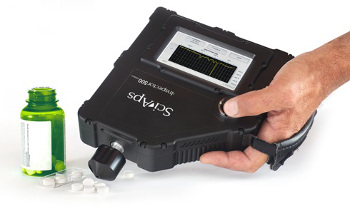Introducing the SciAps Inspector 500 featuring novel 1030 nm laser technology – designed for MCC’s and other tough samples.
Microcrystalline cellulose (MCC) is one of the most ubiquitous excipients-it is metabolically inert, not degraded during digestion, and has no appreciable absorption. Many grades of MCC provide excipient solutions to the many challenges of direct compression formulations including improved flow, better compressibility, and accommodation of moisture-sensitive active ingredients.

SciAps (formerly DeltaNu) is pleased to announce the Inspector 500, a truly handheld Raman analyzer based on a unique 1030 nm laser excitation approach.
Handheld Raman analyzers are an ideal tool for verification of cellulosic based excipients and other materials in receiving areas for pharmaceutical manufacturing. The Inspector 500, with its 1030 nm laser provides the suppression of fluorescence that is critical for analyzing MCC's and other compounds. Yet it also offers the benefit of a higher response and improved portability than the more standard 1064 nm laser based Raman systems.
The result – a truly handheld, lightning fast, lightweight Raman-based analyzer that allows operators to efficiently and rapidly verify the materials identity and quality.
Why a 1030 nm Raman laser? Many handheld Raman systems are based solely upon 785 nm technology and these systems can have difficulty discriminating among the different types of cellulosic based excipients. This is specifically the case for Crosmarcmellose and MCC generic. When analyzed by 785 nm Raman, the resulting spectra are generally featureless and difficult to discriminate. These compounds and many others, are easily verified by the 1030 nm laser technology featured in the Inspector 500.